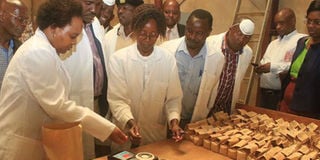State developing new system to raise coffee farmers’ income

From left: Kirinyaga Governor Anne Waiguru and Industry, Trade and Cooperatives Cabinet Secretary Peter Munya inspect a machine that measures coffee moisture, at Sagana Coffee Mills in Kirinyaga on September 14, 2018. They promised to resuscitate the sector. PHOTO | JOSEPH KANYI | NATION MEDIA GROUP
What you need to know:
- Currently, coffee pricing is determined by millers, marketing agents and dealers, who collude to offer low prices.
- Coffee production in the country has declined from over 178,000 tonnes to 44,000 tonnes annually due to poor crop husbandry, soil acidity and changing weather patterns.
The national government is seeking to overhaul the Nairobi Coffee Exchange by introducing a system that will provide an open international market for locally produced coffee.
Speaking during the launch of coffee reforms aimed at resuscitating the ailing sector, Industry, Trade and Cooperatives Cabinet Secretary Peter Munya said the new system will ensure that farmers increase their profits.
"We want the market to be transparent through this system that will see the highest bidders buy our coffee, which will in turn translate to better prices for our farmers," Mr Munya said during the function in Nyeri on Saturday.
The Cabinet Secretary noted that coffee farmers will now be able to monitor the prices of the crop on screens set up in the county, giving them an upper hand in the sale of coffee to the international market.
OPEN MARKET
Additionally, he said the new system will involve the farmers directly, instead of having marketers negotiate on their behalf.
“In the open market, there will be no manipulation, management, control or secret negotiations. Rather there will be transparency and it will also involve the farmers,” he emphasised.
With the shift, farmers will have direct contact with marketers, and even greater access to the coffee buyers. Currently, coffee pricing is determined by millers, marketing agents and dealers, who collude to offer low prices.
During their presentations before Mr Munya, the farmers complained of massive extortion at the Nairobi auction, which they said had become a cash cow for millers and marketers to their detriment.
This is among the radical changes the government has put in place to revitalise the sector by increasing productivity, producing quality beans and increasing farmers' pay.
INCOME
Coffee production in the country has declined from over 178,000 tonnes to 44,000 tonnes annually due to poor crop husbandry, soil acidity and changing weather patterns.
Some people have also abandoned coffee for more profitable crops and business ventures, deepening the woes in the sector.
Kirinyaga Governor Anne Waiguru said counties will support the commodity exchange, noting that it will fetch better prices for them.
She said the government must show as much commitment in resolving problems in the sector as it has shown in addressing issues raised by sugarcane and maize growers.
Additional reporting by Joseph Wangui






